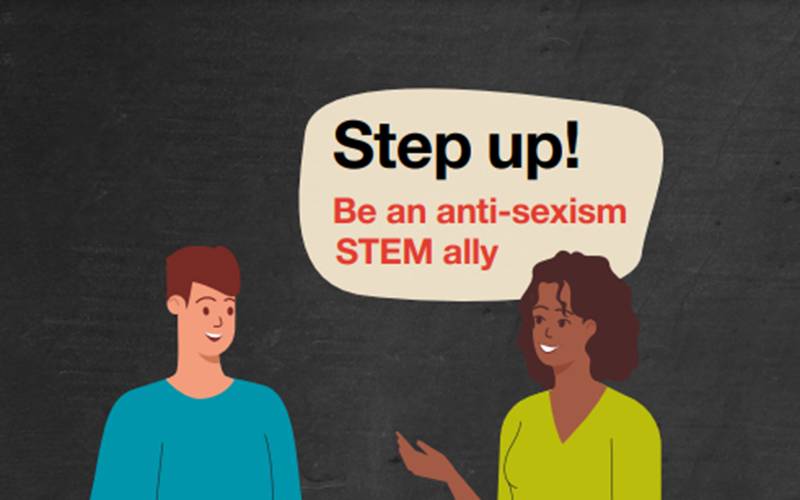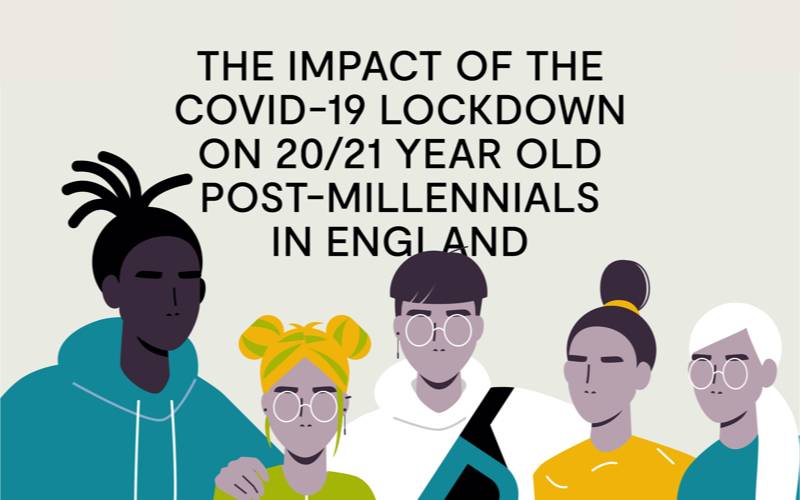Range of publications related to the ASPIRES project.
Step up! Be an anti-sexism STEM ally

Download:
- Step up! Be an anti-sexism STEM ally [Poster] (PDF)
- Step up! Be an anti-sexism STEM ally [Leaflet] (PDF)
These resources support and challenge people to be an anti-sexism ally; a person who takes a stand against gender oppression.
The ASPIRES study surveyed students in England and found that women undergraduate STEM students are significantly more likely than those in non-STEM areas to experience sexism – most frequently from male peers. Experiences of sexism continue in the workforce and are associated with women leaving STEM. There are many benefits to challenging sexism and promoting inclusion in STEM, including improving recruitment and retention of talent; more collaborative, creative and effective learning environments; and safer, happier staff and students.
October 2023.
"Make it more relevant and practical"
Young people’s vision for school science in England
Download:
- Report (PDF, 1.3 MB)
- Executive Summary (PDF, 0.5 MB)
Young people wanted:
- more practical/experimental work in their science lessons
- better links between the science curriculum and their everyday life
- more caring teachers and more consistency in teachers throughout secondary school science, and
- less exam pressure.
This report explores the views of over 7,600 young people (aged 20-22) who participated in the ASPIRES 3 study. Specifically, we share their experiences of school science and what improvements they recommend for policy and practice.
December 2022.
The impact of the COVID-19 lockdown on 20/21 year old post-millennials in England
ASPIRES 3

Download:
- Project Spotlight 1: COVID-19 (PDF, 0.4 MB)
Early research from the third phase of the ASPIRES study suggests that 20 and 21 year olds in England feel they are missing out on the 'best years' of their lives due to the 2020 pandemic and subsequent lockdown.
We’ve pulled together the views of young people to make recommendations for those working in policy, higher education and who work with young people in England.
This project spotlight uses data from interviews with n=48 20/21 year-olds, recorded remotely during the early months of the 2020 UK COVID-19 lockdown (May - August 2020).
October 2020.
Supporting increased and wider participation in STEM
Download:
- Report (PDF, 0.8 MB)
STEM (Science, Technology, Engineering and Mathematics) skills are widely recognised as being highly important for national economic competitiveness, greater upward social mobility and active citizenship. There is a strongly held belief that our future economy and workforce are facing a STEM skills gap and we need more young people to continue with STEM post-16, from more diverse backgrounds, to fill it.
This policy briefing summarises the key findings from our ASPIRES 2 report.
February 2020.
Women in Physics
ASPIRES 2
Download:
- Policy Briefing (PDF, 0.5 MB)
Participation in post-compulsory physics remains low and unchanged, with the proportion of students studying physics at A level in the UK noticeably lower than those studying other sciences. Not only do a minority of students tend to see physics as ‘for me’, but the field of physics itself also shapes and normalises its masculine, elite status.
This policy briefing summarises some of the ASPIRES 2 project’s academic papers on the topic of women in physics.
August 2018.
Triple Science
ASPIRES 2
Download:
- Policy Briefing (PDF, 0.4 MB)
Selective practices around access to, and participation in, Triple Science perpetuate social inequalities and could be narrowing participation in post-16 STEM.
This policy briefing uses data from over 13,000 Year 11 students, and interviews with 70 of these students, to review the provision of current practice of stratifying science options at GCSE.
August 2018.
Year 11 Students' Views on Careers Education and Work Experience
ASPIRES 2
Download:
'Careers education is not just 'patchy', it is patterned in terms of social inequalities'
This report uses survey data from over 13,000 Year 11 students, and interviews with 70 of these students, to review the provision of careers education and work experience in England.
February 2016.
Understanding Young People's Science Aspirations
Download:
How students form ideas about 'becoming a scientist'
Our 'ASPIRES Book' offers an explanation of how some young people do become dedicated to follow science, and what might be done to increase and broaden this population. We explore the need for increased scientific literacy among citizens to enable them to exercise agency and lead a life underpinned by informed decisions about their own health and their environment.
August 2016.
What shapes children's science and career aspirations age 10-13?
ASPIRES
Download:
ASPIRES Interim Research Report 'Young people are not generally being put off careers in science because they find science dull or because of negative views of scientists'
A summary report on the key findings from the first two data collections of the ASPIRES Project.
March 2013.
Ten Science Facts and Fictions: The Case for Early Education about STEM Careers
Download:
'More needs to be done to make science a 'conceivable' career option for a broader range of pupils'
Recommendations for the pressing need to integrate an awareness of STEM careers into the mainstream school curriculum.
January 2012.
 Close
Close

